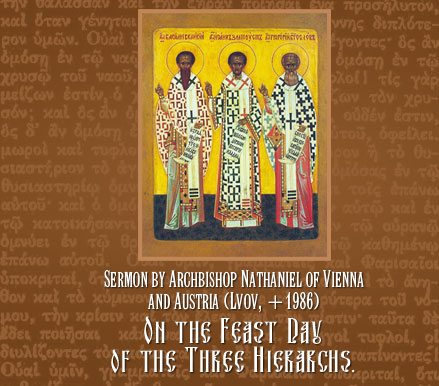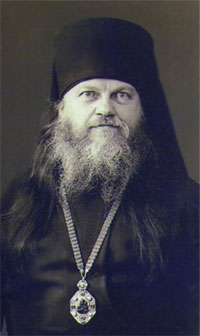
 �Sharers of the Apostles� life and character and teachers of the universe,� sings the Church today, praising SS Basil the Great, Gregory the Theologian and John Chrysostom. Not only in this most important prayer of this feast day, but in a series of other moments during their veneration does the Church stress their proximity to the Apostles, their direct succession from the Apostles in their ecclesiastical glorification. When we clergymen perform the prosthesis, immediately after commemorating the Apostles, we are to commemorate �our Fathers the Universal Great Hierarchs and Teachers Basil the Great, Gregory the Theologian and John Chrystostom.� The same is repeated in the Litany at the end of a festive vespers and in the litany during the matins. �Sharers of the Apostles� life and character and teachers of the universe,� sings the Church today, praising SS Basil the Great, Gregory the Theologian and John Chrysostom. Not only in this most important prayer of this feast day, but in a series of other moments during their veneration does the Church stress their proximity to the Apostles, their direct succession from the Apostles in their ecclesiastical glorification. When we clergymen perform the prosthesis, immediately after commemorating the Apostles, we are to commemorate �our Fathers the Universal Great Hierarchs and Teachers Basil the Great, Gregory the Theologian and John Chrystostom.� The same is repeated in the Litany at the end of a festive vespers and in the litany during the matins.
These very saints sensed and confessed their closeness to the Apostles. Of the many statements of theirs, I will point to the words of St John Chrysostom, who said: �Of all the glories of Rome, what I would see is not palaces nor monuments, not the great conquerors nor legislators, but our holy teachers, Chief Apostles Peter and Paul. O if we could be given to see them, to hear their life-creating preaching!� �
I would like to address to these three saints the same words: �O if we could be given to see them, to hear the life-giving words of their sermons!� �
To see St Basil the Great, and hear him respond when he stood before the Prefect Modestus, Imperial Plenipotantiary�who represented the master of the universe, omnipotent and terrible in cruelty�in response to the demand to return to the religion of the Emperor�Arianism�or at least to hand over the Orthodox churches to the Arians, under threat of confiscation, exile, torture and death:
�Think of some other threat. These have no influence on me. He runs no risk of confiscation who has nothing to lose except these mean garments and a few books. Nor does he care about exile who is not circumscribed by place, who makes not a home where he now dwells, but everywhere a home whithersoever he be cast -or rather everywhere God's home, whose pilgrim and wanderer he is. Nor can tortures harm a frame so frail as to break under the first blow. You could but strike once, and death would be gain. It would but send me the sooner to Him for whom I live and labor, nay, am dead rather than live, to whom I have long been journeying.�
�None has ever spoken to me this way before!� cried the Prefect.
�You have never spoken yet with a bishop,� responded St Basil humbly.
How one would wish to be in the Church of St Anastasios in Constantinople, when St Gregory the Theologian read his Nativity Sermon and, filled with the Divine Spirit, exclaimed �Christ is born; glorify Him. Christ is from heaven; Christ is on earth; be exalted.� We can only imagine the electricity, the spiritual lightning that flashed through the souls of those who heard these words for the first time, which became the primary hymn to the Nativity of Christ.
How we would love to share the spiritual joy of the Christians who first heard the sermon of St John Chrysostom, which even to this day shakes our souls on Paschal night: �If any man be devout and love God, let him enjoy this fair and radiant triumphal feast.��
We owe a great deal to these three hierarchs, we could never count the ways. They defended and firmly established Holy Orthodoxy. Basil the Great and John Chrysostom developed the rite of Divine Liturgy. St Gregory the Theologian filled our divine services with his inspired prayers and songs.
How are we to repay our debt of love and gratitude?�
Only through our prayers, warmed with love, and our fervent pleas that they ignite in our hearts but a reflection of the eternal light which illuminated their hearts.
|